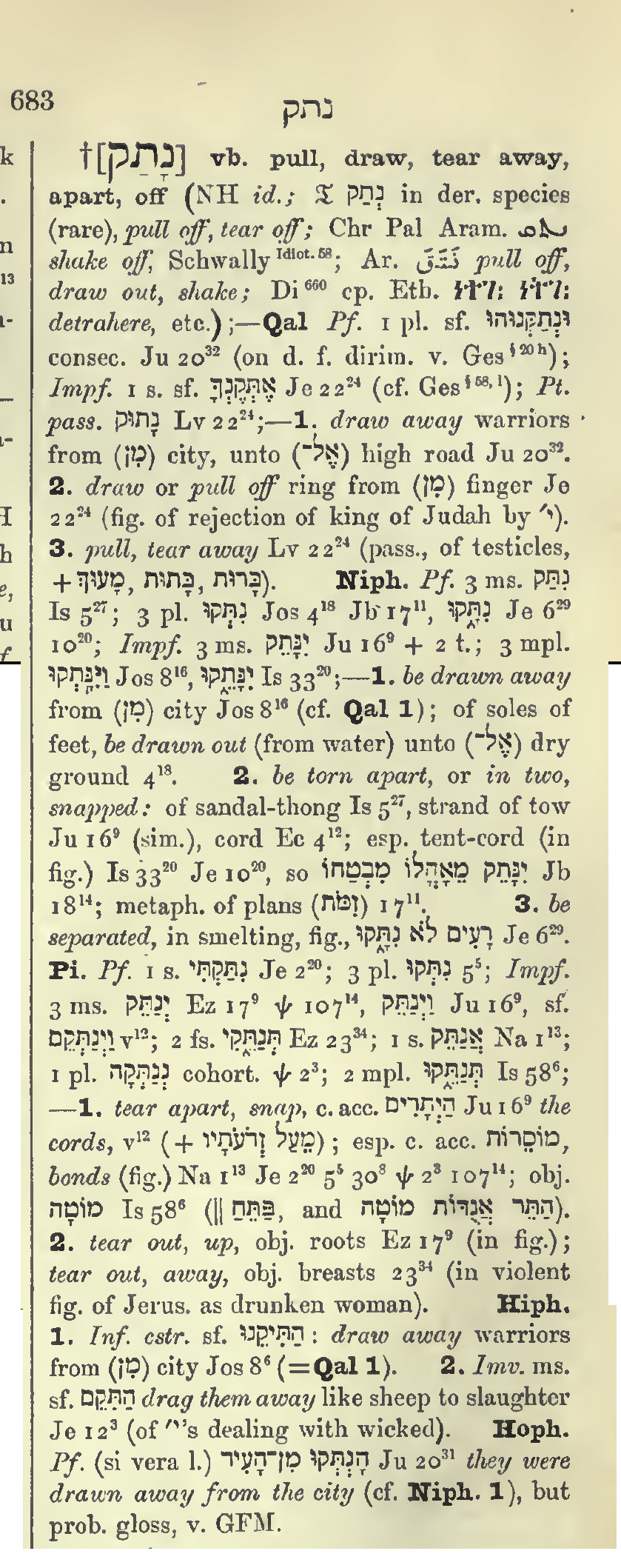The root געש appears thirteen times in the Hebrew Bible:
יהושע כד:ל
וַיִּקְבְּר֤וּ אֹתוֹ֙ בִּגְב֣וּל נַחֲלָת֔וֹ בְּתִמְנַת־סֶ֖רַח אֲשֶׁ֣ר בְּהַר־אֶפְרָ֑יִם מִצְּפ֖וֹן לְהַר־גָּֽעַשׁ:
שופטים ב:ט
וַיִּקְבְּר֤וּ אוֹתוֹ֙ בִּגְב֣וּל נַחֲלָת֔וֹ בְּתִמְנַת־חֶ֖רֶס בְּהַ֣ר אֶפְרָ֑יִם מִצְּפ֖וֹן לְהַר־גָּֽעַשׁ:
שמואל ב כב:ח
ותגעש [ק' וַיִּתְגָּעַ֤שׁ] וַתִּרְעַשׁ֙ הָאָ֔רֶץ מוֹסְד֥וֹת הַשָּׁמַ֖יִם יִרְגָּ֑זוּ וַיִּֽתְגָּעֲשׁ֖וּ כִּֽי־חָ֥רָה לֽוֹ:
שמואל ב כג:ל
בְּנָיָ֙הוּ֙ פִּרְעָ֣תֹנִ֔י הִדַּ֖י מִנַּ֥חֲלֵי גָֽעַשׁ:
ירמיהו ה:כב
הַאוֹתִ֨י לֹא־תִירָ֜אוּ נְאֻם־יְקֹוָ֗ק אִ֤ם מִפָּנַי֙ לֹ֣א תָחִ֔ילוּ אֲשֶׁר־שַׂ֤מְתִּי חוֹל֙ גְּב֣וּל לַיָּ֔ם חָק־עוֹלָ֖ם וְלֹ֣א יַעַבְרֶ֑נְהוּ וַיִּֽתְגָּעֲשׁוּ֙ וְלֹ֣א יוּכָ֔לוּ וְהָמ֥וּ גַלָּ֖יו וְלֹ֥א יַעַבְרֻֽנְהוּ:
ירמיהו כה:טז
וְשָׁת֕וּ וְהִֽתְגֹּֽעֲשׁ֖וּ וְהִתְהֹלָ֑לוּ מִפְּנֵ֣י הַחֶ֔רֶב אֲשֶׁ֛ר אָנֹכִ֥י שֹׁלֵ֖חַ בֵּינֹתָֽם:
ירמיהו מו:ז-ח
מִי־זֶ֖ה כַּיְאֹ֣ר יַֽעֲלֶ֑ה כַּנְּהָר֕וֹת יִֽתְגָּעֲשׁ֖וּ מֵימָֽיו: מִצְרַ֙יִם֙ כַּיְאֹ֣ר יַֽעֲלֶ֔ה וְכַנְּהָר֖וֹת יִתְגֹּ֣עֲשׁוּ מָ֑יִם וַיֹּ֗אמֶר אַֽעֲלֶה֙ אֲכַסֶּה־אֶ֔רֶץ אֹבִ֥ידָה עִ֖יר וְיֹ֥שְׁבֵי בָֽהּ:
תהלים יח:ח
וַתִּגְעַ֬שׁ וַתִּרְעַ֨שׁ׀ הָאָ֗רֶץ וּמוֹסְדֵ֣י הָרִ֣ים יִרְגָּ֑זוּ וַ֝יִּתְגָּֽעֲשׁ֗וּ כִּי־חָ֥רָה לֽוֹ:
איוב לד:כ
רֶ֤גַע׀ יָמֻתוּ֘ וַחֲצ֪וֹת לָ֥יְלָה יְגֹעֲשׁ֣וּ עָ֣ם וְיַעֲבֹ֑רוּ וְיָסִ֥ירוּ אַ֝בִּ֗יר לֹ֣א בְיָֽד:
דברי הימים א יא:לב
חוּרַי֙ מִנַּ֣חֲלֵי גָ֔עַשׁ אֲבִיאֵ֖ל הָעַרְבָתִֽי:
In the case of the burial place of Joshua, הר-געש is a place name, as is the case with חורי and הדי who are from נחלי געש.
געש seems to be something that waters (both rivers/streams – Jer. 46:7-8 and seas – Jer. 5:22) and the Earth (II Sam. 22:8, Psalms 18:8) do. The two remaining instances of this root, Jer. 25:16 and Job 34:20 refer to people.
According to BDB, the verb means to shake or quake. With reference to people, they “reel to and fro“. HALOT also has “rumble” but suggests in addition to “bubble up, belch, shit, vomit, ruminate”. For the Earth they suggest “to rise and fall loudly“, for water, “to surge“, and for drunken humans “to vomit loudly“.
Greenfield (HUCA 29, 1958) suggests:
Rather than “to shake, quiver,״ we must assume with G. R. Driver that “to heave (of the stomach in retching or vomiting)״ is the initial concrete sense of this verb in Hebrew. Driver comes to his conclusion on the basis of the LXX’s use of forms of the same Greek verb for והתגעשו (Jer. 25.16) and וקיו (Jer. 25.27). On this basis he translated the beginning of Jer. 25.16 ושתו והתגעשו והתהללו as “and they shall drink and have a heaving of the stomach (retch, vomit) and be maddened (with intoxication).״
